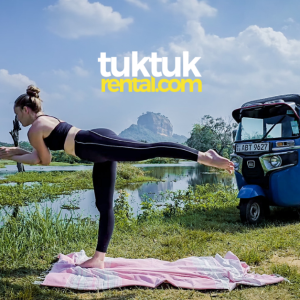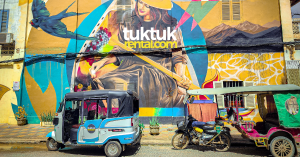Author : Karandeep
Yoga Retreats in Sri Lanka (Different Retreat Types, TTC Details, and More)
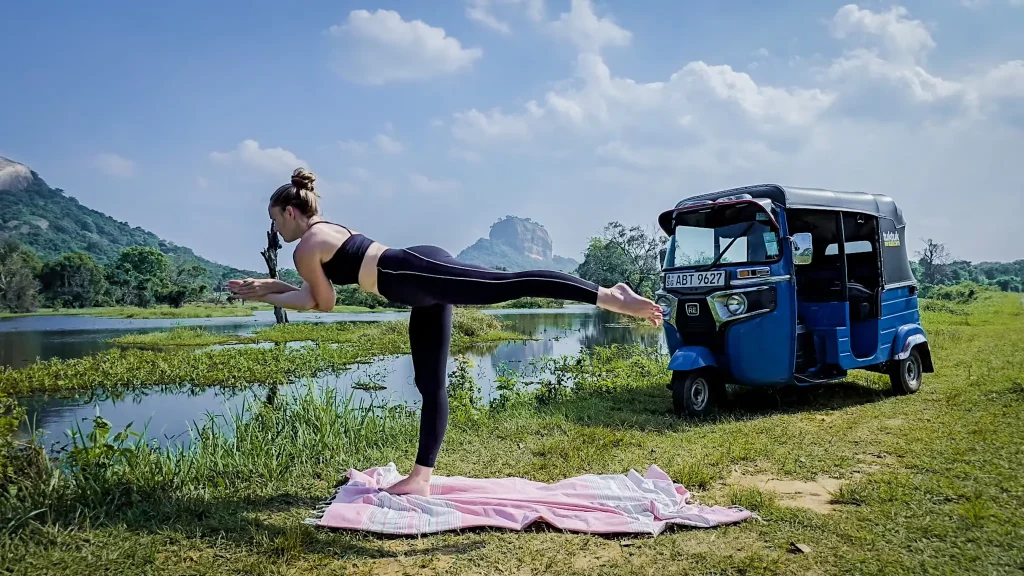
A distinct form of spiritual awakening has been practiced in Sri Lanka long before yoga retreats became a trend.
Where else can you practice sun salutations overlooking a tea estate, then unwind with pranayama by the ocean? Similarly, its fusion of yoga with Ayurveda rolls out herbal healing and dosha-balancing practices. This is something uncommon in Western-style retreats.
Add in the Buddhist influence on mindfulness, and you’re looking at a whole new avenue of silent meditation and Vipassana techniques.
- Buddhist monks meditating in rock-cut caves of Dambulla
- Ancient ayurvedic healers using medicinal plants in the misty Knuckles mountains
- Or the energy-rich sites of Sigiriya and Kataragama that attract spiritual seekers
This island nation has been helping travelers like you restore their inner balance for quite some time.
Regardless of whether you’re a first-timer yoga enthusiast or a traveler looking for an intensive yoga Teacher Training Course (TTC), this complete guide on Yoga retreats in Sri Lanka will kickstart your practice.
Rent a Self-Drive Tuktuk for Your Sri Lanka Trip
Why Sri Lanka Stands Out as a Global Yoga Destination
Many travellers don’t realize that more than a tropical getaway, Sri Lanka is a land for inner transformation. Monks, sages, and Ayurvedic healers have silently used Ceylon’s sacred forests and temple ruins as spaces for meditation and renewal. And unlike retreats in Bali or Thailand, the wellness programs here often integrate Ayurvedic detox therapies.
Even better, many Sri Lankan yoga hotspots are built near ancient power centers. For instance, Dambulla is home to the country’s oldest meditation caves, and Adam’s Peak is a pilgrimage destination welcoming people of different faiths.
Consider renting a private tuktuk and riding across these spiritual hotspots in Sri Lanka.
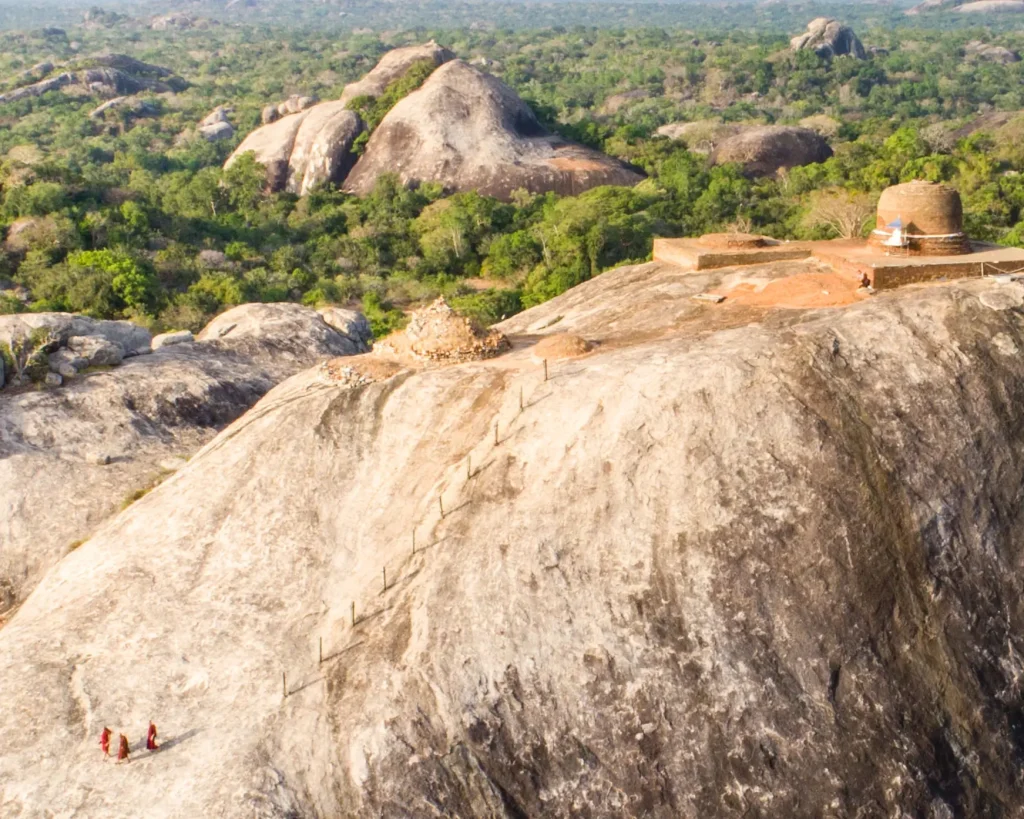
Different Styles of Yoga Retreats in Sri Lanka
Here’s a deeper look into what specific yoga retreats in Sri Lanka offer:
1. Detox and Ayurveda Yoga Retreats
Such yoga retreats cleanse the body and mind through ancient panchakarma therapies and Ayurvedic diets, including yoga postures that stimulate detoxification.
Expect to participate in Trataka (candle-gazing meditation). This powerful technique purifies the eyes and mind through guided visualization. Next, you’ll try Shatkarma (yogic cleansing rituals) like Jala Neti for nasal irrigation and Vamana Dhauti for therapeutic vomiting. Both these techniques have helped humans clear toxins for ages.
Moreover, your dietary palette will experience a whole new effect through custom meal plans based on dosha imbalances. You’ll be consuming a mix of gotu kola, ashwagandha, and turmeric elixirs.
Best Locations: Choose Ayurvedic-heavy regions like Kandy, Ella, and Dambulla to experience centuries-old healing traditions.
2. Yoga and Adventure Retreats
These retreats merge yoga with high-energy activities like surfing, rock climbing, and jungle treks. All that variation in movements steers you clear of the ill effects of a sedentary lifestyle, also giving your adrenaline the pump it deserves on your travels.
You can opt for dynamic Vinyasa and power yoga to practice flows specifically designed to complement muscle recovery after intense sports. Bring in some animal flow with primal movement yoga to understand body control and fluidity. Remember, mimicking the primal movements of animals may sound simple, but it tests your body in ways you never thought existed.
Moving on, you can practice jungle meditation in eco-yoga rainforest clearings. Few things are as grounding as feeling for yourself how yogis moved barefoot on raw earth and used breathwork as a daily practice.
Tip: Request your yoga teacher for Ujjayi (ocean breath) practices for mental clarity while surfing or diving.
3. Silent and Vipassana Yoga Retreats
Have you ever tried emphasizing silence and deep meditation when traveling?
Retreats like these inspire you for a periodic mental detox and emotional healing practice. From chanting specific Sanskrit mantras for chakra alignment to practicing Kinhin (Zen walking meditation) among holy Buddhist sites, you’ll be amazed by their intellectual effects.
Also, do try Mauna Vrata, otherwise called noble silence. Basically, you make a vow for several days to cut off verbal and non-verbal communication and deepen inner awareness.
Best Locations: Choose places like Anuradhapura, where age-old meditation lineages still exist.
4. Off-Grid Jungle Retreats
Here’s an option if you’re trying to experience the yogic minimalism and sustainability lifestyle on your travels. Such retreats are often held in remote jungle locations and include inner development activities like natural building workshops and fire rituals under the stars.
You may try Homa fire ceremonies, which are essentially ancient Vedic rituals offered to the elements. They literally cleanse the environment around you and also the self. If some yoga retreats are still into Japanese-Sri Lankan fusion practices, do try forest bathing. This activity helps you absorb the life force (prana) of the jungle.
Tip: Try nature-inspired asana sequences like flows that mimic tree growth, bird movements, and the slow unfolding of lotus petals.
We recommend you (and your friends if they’re around) to reserve a private tuktuk and experience different remote spots around your preferred yoga retreat.
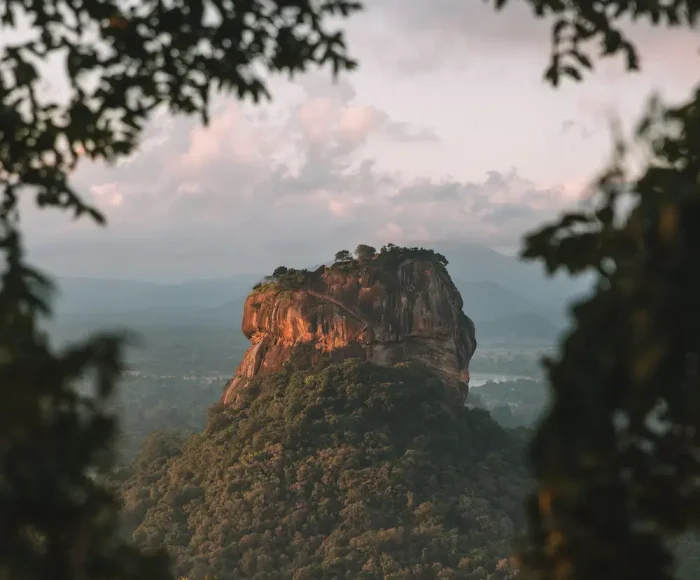
Why More Yoga Practitioners are Choosing Sri Lanka for TTCs
Yoga TTCs in Sri Lanka are enjoying a growing reputation for travelers and aspiring and experienced yoga teachers. Here are the three core pillars running the show of wellness in these yoga retreats in Sri Lanka:
Eco-Immersion Learning
Unlike conventional yoga studios, an abundance of TTC programs in Sri Lanka takes place in nature-based shalas. You’ll practice asanas on cliffside decks and head out for yogic expeditions in spiritually graced monasteries. If you’re lucky, you may get to study yogic texts by candlelight in jungle lodges.
Ayurveda-integrated Training
Varying from the TTCs in Southeast Asia, Sri Lanka’s yoga and wellness programs often merge yoga education with traditional Ayurveda. What entices yoga-inspired travelers is the chance to undergo dosha assessments and learn about food-as-medicine principles.
Lineage-based Yoga
Many teacher training programs in Sri Lanka are led by Indian-trained yogis or lineage holders. And you’ll find them as your teachers in both classical Hatha yoga and Buddhist meditation traditions. It’s fair to say that you’ll receive deep-rooted teachings rather than the commercialized versions of yoga found in some other destinations.
Understanding Different TTC Courses in Sri Lanka Yoga Retreats
Here’s a quick table summarizing different TTC courses in Sri Lanka:
Course Level | Ideal Student | Duration | Core Focus | Unique Sri Lankan Offering |
100-Hour TTC | Beginners wishing to deepen their spiritual practice | 2 weeks | Basics of yoga, breathwork, philosophy | Guided meditations in Buddhist caves or temples |
200-Hour TTC | Aspiring yoga teachers looking for certification | 1-month | Teaching methodology, anatomy, sequencing | Ayurveda chakra balancing and traditional healing |
300-Hour TTC | Experienced teachers refining their skills | 4-6 weeks | Advanced postures, therapy, adjustments | Eco-retreats with silent meditation immersions |
500-Hour TTC | Master-level training for deep immersion | 8+ weeks | Deep knowledge for senior teachers | Monk-led Vipassana training, yoga therapy, and mentorship |
Bonus Read: You may want to learn about Sri Lanka weather in September if that’s when your yoga retreat is.
How to Choose the Right Yoga Retreat in Sri Lanka
Remember, many travelers choose yoga retreats equal to an Instagrammable spot. Instead of social media, you must prioritize an experience for your wellness:
What to Look For
Here are green signals that you’re probably visiting a genuine Sri Lankan yoga retreat:
- Check if it aligns with your intention. Mountains for introspection, beaches for fluid movement, jungles for grounding; this a good mantra to follow.
- Verify if the instructors are certified by Yoga Alliance or trained under recognized lineages.
- The ideal ratio is 10-15 students per teacher for quality attention.
- Ask if they offer teachings beyond asanas. These include Ayurveda, meditation, and yoga philosophy sessions.
- Look beyond TripAdvisor and Booking.com. You want to check Google reviews, testimonials, Instagram comments, and websites that specialize in displaying yoga and wellness retreats.
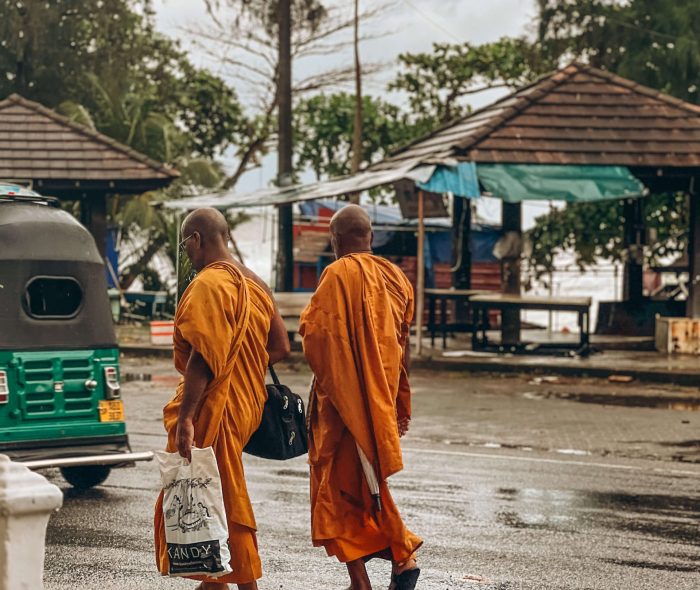
What to Avoid
Each of these are clear red flags of an inauthentic yoga retreat:
- Resorts that use “yoga” as a marketing gimmick but focus on tourism.
- Teachers with no actual credentials — many retreats hire uncertified instructors.
- Large group classes that feel like fitness boot camps instead of personalized practice.
- Programs that only focus on physical postures without deeper knowledge.
Tip: Ask yourself if you’re choosing a retreat to deepen your connection to your mind and body, or simply for the aesthetic appeal.
Common Misconceptions About Wellness Retreats in Sri Lanka
Lastly, here are some common myths people have about such wellness and yoga retreats:
“All yoga retreats are authentic.”
Many yoga retreats are targeting tourists rather than serious practitioners. Some programs teach diluted versions of yoga, stripping you of its spiritual depth.
2. “A beautiful location means a good retreat.”
Just because a retreat is set on a stunning beachfront or in a luxury eco-lodge doesn’t mean the teaching is high-quality.
3. “Short retreats can replace long-term practice.”
A 3 or 7-day retreat won’t transform your life if you don’t continue practicing. Look for programs that equip you with tools to maintain your practice beyond the retreat.
4. “All TTCs prepare you to teach.”
Some 200-hour TTC programs focus more on self-practice rather than actual teaching. If your goal is to teach professionally, look for courses that focus on real classroom experience, anatomy workshops, and hands-on adjustments.
5. “If I’m not flexible, I can’t do a TTC.”
More than flexibility, a TTC is about your commitment to learning. Remember, many aspiring teachers struggle with certain postures but excel in teaching methodology and philosophy.
Bonus Read: Access this 2-week southern route self-drive tuktuk itinerary if you plan to visit Cambodia.
You might also consider downloading the Tuktukrental Travel App. It features offline maps, offbeat recommendations and even helps fellow tuktuk-ers on the road connect for information or a few post-drive beers – or the local Sri Lankan arrack if you are feeling adventurous!

